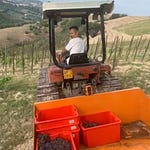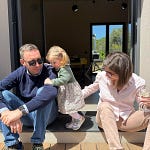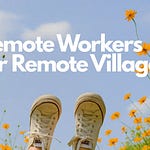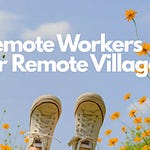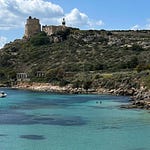Fare impresa da un paese di 3.000 abitanti (e farlo bene): la lezione di Nicolas Verderosa di Ruralis
Dall’Irpinia al digitale, dalla casa rurale all’impatto sociale: la storia di un imprenditore che dimostra come il lavoro in remoto possa rigenerare i territori più dimenticati.
Quando abbiamo ideato la serie “Remote Workers for Remote Villages”, l’obiettivo era chiaro: raccontare storie vere di chi, lavorando da remoto o costruendo imprese nei borghi, sta ridando senso e futuro a luoghi che molti considerano “perduti”.
Per questo mi è sembrato naturale coinvolgere Nicolas Verderosa, fondatore di Ruralis.com, una realtà che da anni lavora per valorizzare il patrimonio abitativo e umano delle aree interne italiane.
Con Nicolas ci conosciamo da tempo: ho scritto di lui già qualche anno fa su Startup-News.it, quando provai a “stressare” il suo modello di business per capire se e come potesse reggere davvero. Da allora è nato un dialogo continuo, spesso acceso, ma sempre costruttivo — fino a una mia visita in Irpinia per vedere da vicino come lavora lui e il suo team.
E posso dirlo: funziona.
Funziona perché Ruralis non è solo un’impresa digitale, ma un ecosistema di relazioni, fiducia e rigenerazione che parte da un piccolo paese di 3.000 abitanti e arriva a coinvolgere oltre 420 proprietari, l’80% dei quali vive in aree interne.
Un modello che unisce digitale e territorio
Durante la nostra intervista, Nicolas ha raccontato in modo molto concreto come si può fare impresa partendo da un luogo remoto.
Il suo team è ibrido — una parte lavora sul posto, l’altra da remoto — ma la missione è comune: rimettere in circolo valore nei territori.
Ogni casa riaperta, ogni ospite accolto, ogni servizio attivato genera movimento, reddito e — soprattutto — fiducia in un’Italia che non vuole scomparire.
“Ogni casa che torna viva – mi ha detto – è una famiglia che rientra, un paese che respira, un’economia che si riaccende.”
Perché parlarne oggi
L’intervista con Nicolas è stata registrata settimane fa. Ma ho scelto di pubblicarla solo ora, perché il tema di fondo — il valore degli affitti brevi per le aree interne — è tornato di bruciante attualità.
Negli ultimi giorni, infatti, è circolata la notizia di una nuova ipotesi di legge finanziaria che aumenterebbe la cedolare secca sugli affitti brevi dal 21% al 26%, mantenendola al 21% solo per chi affitta senza usare piattaforme di intermediazione.
Un’idea che, come ho già scritto su LinkedIn e su ITS Journal, appare tanto confusa quanto potenzialmente dannosa.
Per questo ho voluto ricontattare Nicolas e chiedergli cosa ne pensa.
La sua risposta — che condivido pienamente — è stata chiara e articolata:
“Probabilmente chi ha fatto questa proposta non ha studiato abbastanza. O vuole colpire gli intermediari più che i proprietari. Ma mi chiedo anche se sia costituzionale tassare in modo diverso in base a come si affitta. Così si rischia solo di incentivare il nero.”
E ha aggiunto:
“È un segnale sbagliato verso chi innova. Si punisce chi cerca di portare servizi e trasparenza nel settore, e si dimentica che dietro molti annunci non ci sono multinazionali, ma famiglie. Spesso un solo immobile, spesso in zone interne. Senza queste attività, interi borghi perderebbero una fonte di economia diffusa e visibilità.”
Sono considerazioni di buon senso, che dovrebbero far riflettere.
Oltre 500.000 annunci di affitti brevi in Italia appartengono a proprietari con un solo immobile.
Parliamo di famiglie che spesso riescono, grazie a quel piccolo reddito, a tenere in vita case e paesi, non di speculatori seriali.
Le aree interne non sono un dettaglio
Nel suo lavoro, Nicolas lo vede ogni giorno: portare anche solo poche persone in questi luoghi significa riaccendere una microeconomia, ma anche — e forse soprattutto — una speranza.
Il turismo diffuso, se gestito bene, diventa una forma di rigenerazione culturale e sociale.
Eppure, come lui sottolinea, “nelle decisioni politiche le aree interne non vengono mai considerate”.
Ecco perché la storia di Ruralis va oltre l’attualità normativa: è la dimostrazione che innovazione e appartenenza non sono incompatibili, e che si può costruire un’impresa competitiva partendo da un piccolo borgo campano, anziché da un coworking milanese.
Lascio a voi la provocazione: non solo sul tema degli affitti brevi, ma su cosa significhi davvero innovare dai margini.
Forse, tra un decreto fiscale e un algoritmo di prenotazione, ci siamo dimenticati che il vero sviluppo si misura anche in comunità rigenerate, non in percentuali di rendimento.
Un ringraziamento come sempre ai partner tecnici di questa serie: StreamYard, per le dirette.
Per saperne di più su Ruralis 👉 ruralis.com e… nota bene, non abbiamo alcun ritorno economico dal parlarne (prima che i malpensanti brontolino).
Running a Business from a Village of 3,000 People (and Doing It Well): The Lesson from Nicolas Verderosa of Ruralis
Subtitle:
From Irpinia to digital innovation, from rural homes to social impact — the story of an entrepreneur proving that remote work can help revive forgotten places.
When we launched the “Remote Workers for Remote Villages” series, the goal was clear: to tell real stories of people who, through remote work or local entrepreneurship, are giving new meaning and future to places most have written off as lost.
That’s why it felt only natural to feature Nicolas Verderosa, founder of Ruralis.com, a company that has been working for years to bring new life and value to Italy’s rural and inland areas.
I’ve known Nicolas for a while. Years ago, I wrote about him for Startup-News.it — back when I tried to “stress-test” his business model to see if it could really hold up. From there, we built a lively exchange, sometimes heated, but always constructive — culminating in a visit to Irpinia to see his work up close.
And I can say it plainly: it works.
It works because Ruralis is not just a digital business. It’s an ecosystem of relationships, trust, and regeneration born in a small southern village of 3,000 people — now managing over 420 property owners, 80% of whom are located in Italy’s internal areas.
A Model That Blends Digital and Local
During our interview, Nicolas spoke very concretely about what it means to build and manage a company from a remote rural setting.
His team is hybrid — part local, part remote — but united by a single mission: to keep value circulating within the territories.
Every home reopened, every guest hosted, every service activated brings movement, income, and — most importantly — hope to an Italy that refuses to disappear.
“Every home that comes back to life,” he told me, “is a family returning, a town breathing again, an economy slowly restarting.”
Why Publish This Now
The interview with Nicolas was recorded a few weeks ago.
But I chose to publish it now because its core topic — the role of short-term rentals in supporting rural economies — has suddenly become very current again.
In recent days, a new tax proposal has been circulating in Italy: the government may raise the flat tax on short-term rentals from 21% to 26%, keeping the lower 21% rate only for those who don’t use digital platforms to rent out their properties.
As I’ve already written elsewhere, the measure is both confusing and counterproductive.
So I reached out to Nicolas again to ask for his take.
And his answer — which I fully share — was as sharp as it was thoughtful:
“Probably whoever came up with this didn’t do their homework — or maybe they want to punish intermediaries more than property owners. But I also wonder if it’s even constitutional to tax people differently based on how they rent. The only real outcome would be to push more people into the black market.”
He went on:
“It’s the wrong signal toward innovation. It penalizes those who are trying to bring transparency and modern tools into the sector, and it ignores the reality that behind most listings aren’t corporations but families — often with just one property, often in rural areas. Without them, many small villages would lose an essential source of local income and visibility.”
These are words of common sense that deserve to be heard.
More than 500,000 short-term rental listings in Italy belong to owners with just one property.
That’s half a million families who, thanks to that small income, manage to maintain homes and villages that would otherwise be abandoned — not speculators chasing yield, but micro-hosts keeping Italy’s rural heritage alive.
Rural Areas Are Not a Footnote
As Nicolas reminded me, bringing even a few visitors into these places sparks micro-economies — but also, perhaps more importantly, revives hope.
When done responsibly, short-term rentals become a form of cultural and social regeneration.
And yet, as he notes, “rural areas are never considered in political decisions.”
That’s why the story of Ruralis goes far beyond the latest fiscal debate.
It’s proof that innovation and belonging can coexist, and that you can build a competitive, tech-driven business not from a Milan coworking space, but from a small hilltop village in southern Italy.
I’ll leave you with this thought — not just about short-term rentals, but about what it really means to innovate from the margins.
Somewhere between a tax decree and a booking algorithm, we may have forgotten that genuine progress is measured not in yield percentages but in communities brought back to life.
Special thanks, as always, to our technical partners StreamYard (for making these live interviews possible) and Kinsta (for their flawless hosting and support).
For more about Ruralis: 👉 ruralis.com





